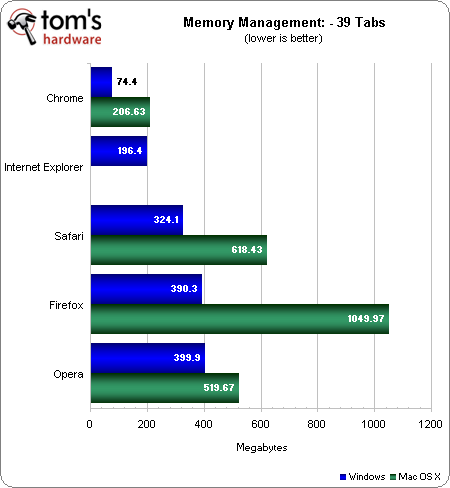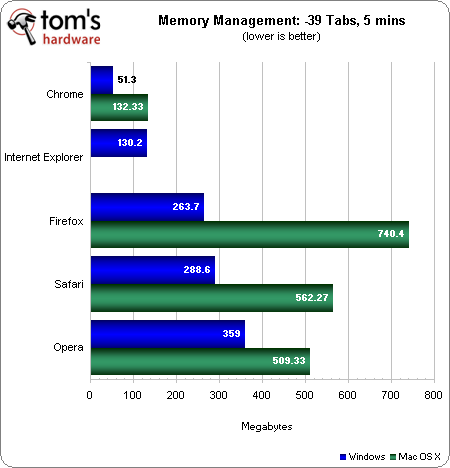Web Browser Grand Prix VI: Firefox 6, Chrome 13, Mac OS X Lion
Chrome 13, Firefox 6, Safari 5.1, and Mac OS X Lion (10.7) have all emerged since our last Web Browser Grand Prix. Today, we test the latest browsers on both major platforms. How do the Mac-based browsers stack up against their Windows 7 counterparts?
Efficiency Benchmarks: Memory Management
We're tweaking the memory management testing methodology. Instead of recording the memory totals five minutes after closing 39 of the 40 tabs, we record the totals immediately. We also throw out the 10 minute totals. Ten minutes is just too long to wait for an application to return unused memory to the operating system. The 10 minute figure is replaced by five minutes.
-39 Tabs
While Chrome demonstrates heavy memory usage, it manages that memory superbly, giving back all but 75 MB to Windows immediately after closing 39 of the 40 tabs. IE9 is in second place, dropping its memory usage to just under 200 MB. Apple Safari takes third place with 325 MB. Firefox 6 holds onto nearly 400 MB, landing itself in fourth place, while Opera actually hits 400 MB, ensuring the Norwegian Web browser a last-place finish.
Chrome also wins in OS X, dropping from 1.8 GB to only 200 MB, which is still lower than any other browser's total in Windows 7. Opera comes in second with nearly 520 MB (not quite half of its 40-tab total). Surprisingly, Apple Safari only places third at 620 MB, just 110 MB less than the 40-tab count. Firefox 6 is the worst performer for immediate memory release on OS X, still using over 1 GB of RAM.
Five More Minutes
After an additional five minutes, Chrome remains firmly in the lead, now only using 50 MB. IE9 also retains second place, giving back another 70 MB to close at 130 MB. Firefox 6 jumps to third, dropping from nearly 400 MB to just over 250. Safari 5.1 loses an extra 60 MB, but not enough to keep Apple out of fourth place. Opera still uses the most memory, only releasing 40 MB more to Windows.
Chrome leads again after five minutes in OS X, dropping down another 70 MB to weigh in at 130 MB. Opera is still in second place at 510 MB, only dropping another 10 MB. Safari remains in third with 560 MB, just 55 MB less. Firefox 6 finally releases a significant amount (300 MB) of memory back to OS X. Unfortunately, that still leaves nearly 750 MB tied up.
Get Tom's Hardware's best news and in-depth reviews, straight to your inbox.
Chrome and Internet Explorer are the clear winners in light-load memory usage and management. However, they also eat up the most memory under heavy load. Firefox and Safari are pretty much equals in Windows 7, and Opera still performs the worst when it comes to memory efficiency. However, on OS X it's Firefox that loses big, while Opera and Safari are close together in the middle. Overall, the Windows 7-based browsers have a substantial edge over their Mac OS X Lion counterparts in this discipline.
Current page: Efficiency Benchmarks: Memory Management
Prev Page Efficiency Benchmarks: Memory Usage Next Page Reliability Benchmarks: Proper Page Loads-
adamovera ne0nguyThe first chart says "higher is better" for the load timethank you, workin' on itReply -
SteelCity1981 Chrome is the best browser out there right now. While FireFox maybe more popular then Chrome is, Chrome has shown why it is the best browser out today. If you haven't used Chrome yet it's def worth a look.Reply -
soccerdocks The reader function in safari actually looks really nice. Although I'd never use Safari on principle. I hope other browsers implement a similar function.Reply -
mayankleoboy1 why does firefox(6/8/9) performa so horribly on the IE9 maze solover test?Reply
chrome13 completely obliterats it.
and firefox 8/9 are still a memory hog.
not really surprised by poor show of ie9. moat updates it gets are "security updates". -
tofu2go Being on a Macbook with only 3GB of memory, memory is the most important factor for me. I open a LOT of tabs and I keep them open for long periods. For awhile I used Chrome, but recently switched to Firefox 6 and saw my memory utilization drop by well over 1GB. Granted with Firefox I was able to do something I am not able to do in any other browser, I could group my tabs into tab groups. I believe this allows for more efficient memory management, i.e. only the current group uses much memory. Not having done any tests, this is pure speculation. All I know is that I'm seeing MUCH lower memory usage with Firefox on OSX. Despite what this article would suggest.Reply -
andy5174 @Google:Reply
Bring back the Google Dictionary, otherwise I will use Bing Search, Firefox and Facebook instead of Google Search, Chrome and G+. -
kartu ReplyFirefox 6 comes in third for both OSes, representing a major drop from Firefox 5.
According to the graphic on "Reliability Benchmarks: Proper Page Loads" on MacOS Firefox is actually second, not third. -
LaloFG I keep Opera, more memory used and time to load pages is nothing when it load pages correctly; and the feeling in its interface is the greater.Reply

